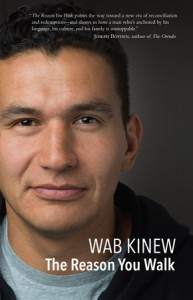This week I read The Reason You Walk by Wab Kinew. Earlier in the term I had attended a talk with Wab and he talked a little about the book. I remembered his introduciton and realized this book might have some of the answers I was looking for.
Decolonization has become a slippery theoretical eel to me. I cannot quite grasp it without crushing it or hammering its head into the cutting board.
The Reason You Walk explores the Wab’s reconciliation with his father. It is a work of creative non-fiction. He discusses the Indian Act, the current state of politics in Canada, and the deep hurts of colonization. The climax is when Wab’s father traditionally adopts the Arch Bishop of the Anglican Church. This act symbolizes a deep forgiveness and a true act of reconciliation. Wab’s father had been horrifically abused in Indian Residential School and had worked his whole life to help his community heal. The price his family paid was emotional distance.
Wab’s father dies of cancer and on his journey to death he works in relationship with Wab to repair their broken bond. By the end they are best friends. This understanding is hard earned.
Wab explores what reconciliation and decolonization means on deeply personal level. What I learned is that decolonization and true reconciliation is about hard work. Work that takes daily, conscious effort. Decolonization is not an easy thing. In fact my good friend, former olympian, and survior of a stab to the chest by a Canadian solider during Oka puts it this way:
“I recently was talking to someone about colonization and decolonization. They are the buzz words these days and my friend wanted to understand it all in what he called “normal” English and not all academic. So I said ” have you ever seen the movie Wolverine?” He said “um Yah, why?” I said remember that black spider thing the woman put on wolverine’s heart? Well let’s say that colonization. That thing clamped on to his heart was designed to suck his special life energy out of him. It was ultimately changing who he was, by slowing his healing and would have killed him if he left it there.
Well he had two decisions; dye slowly while his life is sucked out of him, the less immediately painful choice but ultimately would lead to his demise and he would die not being who he once was…or option 2 was to reach in and rip it out, potentially dying…the more painful but in the end he could regain who he was and he knew there was a good chance he would recover. He decided to “decolonize” his heart..it was hard painful and almost killed him..but he was able to survive it and be what he once was.
I said to my friend, if we are to decolonize, some of the things that have clamped onto our hearts, and almost feel like they are part of us..are really what are killing us..and ripping them out is potentially going to a bit painful, be we have to remember we have the same ability to recover and be strong again….just like wolverine.”
Waneek Horn-Miller
Throughout the book Wab talks about walking in a good way and the red path. Decolonization is a road you walk. You walk it for love. Settlers and Indigenous people both have to walk this road together. Action is what is important.
In education, this means we have consciously walk towards decolonization in our classrooms, policies, resources, pedagogy, and curriculum. Twenty years ago the Royal Commission on Aboriginal People’s gave us action items around education. We have failed miserably. Eleven years ago, the Kelowna Accord gave us directives on closing the gap including in education. We have failed miserably. Last year the Truth and Reconciliation gave us calls to action, many around education. Hopefully, we do not fail again.
If we work together, in relationship, with intention as settlers and Indigenous people, maybe, just maybe we can tackle these gaps that continue to rob Canada of immeasurable human potential.

Yes, walking together is key. Reconciliation includes forgiveness and the willingness to move forward to take the action needed to repair and heal the hurt. I have seen and am seeing this intention in education. Although not there yet, it is a beginning and hopefully a path that will continue to be built.